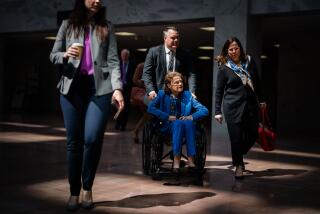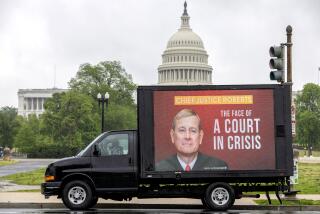Reagan Defends Ginsburg, Says Nominee’s ‘No Addict’ : Byrd Wants Judge to Reconsider
- Share via
WASHINGTON — President Reagan today portrayed the use of marijuana by his latest nominee to the Supreme Court as a youthful indiscretion, but a key senator said 41-year-old Douglas H. Ginsburg should consider withdrawing.
“He was not an addict. He was nothing of that kind. A few experimentations--I’m sure there were a great many people who did that during that particular period,” Reagan told reporters.
Ginsburg acknowledged Thursday that he used the illegal substance once in the 1960s and several times in the 1970s--apparently during a period when he was a member of the Harvard University Law School faculty--an admission that came after reporters sought his comment on drug use allegations. (Story on Page 16.)
Survival Expected
“How many of us would like to have everything we did when we were younger put on the book?” Reagan said.
Asked if he thought Ginsburg could survive the disclosure politically, the President replied: “If there’s any justice in Washington, he can.”
But Senate Majority Leader Robert C. Byrd (D-W.Va.) said Ginsburg should consider withdrawing his nomination, which must be voted on by the Senate.
“I think it is something that Judge Ginsburg should give very, very serious consideration to,” he said.
Even more ominous for Ginsburg’s chances were comments of Republicans such as Sen. Larry Pressler of South Dakota, who said, “I’ve asked the White House to reassess the nomination. If he did use marijuana when he was a professor at Harvard Law School I would have a very difficult time supporting his nomination.
Conflict With Policy
“This Administration is conducting a war on drugs and it will be very hard to explain support for a person who used marijuana while a professor of law.”
Conservative Sen. James A. McClure (R-Ida.) said “of course” the admission was harmful to the nomination, but on the question of withdrawal, he said Reagan “will have to make that determination himself.”
Another conservative, John McCain (R-Ariz.), said the news would be “harmful” to Ginsburg in conservative states. He said the drug use alone would not sink the nomination, but “if it’s one in a series of developments . . . it can be damaging.”
Time of Experimentation
Nancy Reagan, a crusader against drug abuse, said in a statement, “Unfortunately the ‘60s and the ‘70s were a time when a lot of people experimented with pot. Apparently he did, and I’m sorry about that.”
When Reagan was asked if Ginsburg should have “just said no,” the theme of the First Lady’s anti-drug campaign, Reagan chuckled but did not answer.
On Capitol Hill, some of the Democrats who had opposed Robert H. Bork jumped to Ginsburg’s defense on the drug issue.
For example, Senate Judiciary Committee Chairman Joseph R. Biden Jr. (D-Del.) said, “My Lord, this is not a reason to disqualify a person. Do we ask people if they were ever drunk? The question is whether this is relevant to his qualifications to sit on the Supreme Court and I think it is irrelevant.”
FBI spokeswoman Sue Schnitzer, meanwhile, declined to discuss past findings of FBI background checks on Ginsburg when he was nominated for the Justice Department’s top antitrust position and for the U.S. Court of Appeals for the District of Columbia.
Schnitzer said that in typical FBI background checks of federal appeals court nominees, investigators would ask acquaintances whether they had any knowledge of past or present drug use.
“The FBI’s investigative results are largely dependent upon the integrity of those interviewed during these investigations,” she said.
More to Read
Get the L.A. Times Politics newsletter
Deeply reported insights into legislation, politics and policy from Sacramento, Washington and beyond. In your inbox twice per week.
You may occasionally receive promotional content from the Los Angeles Times.










